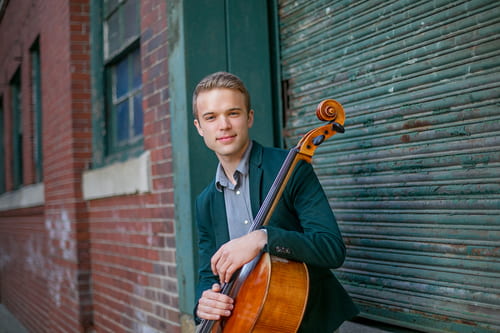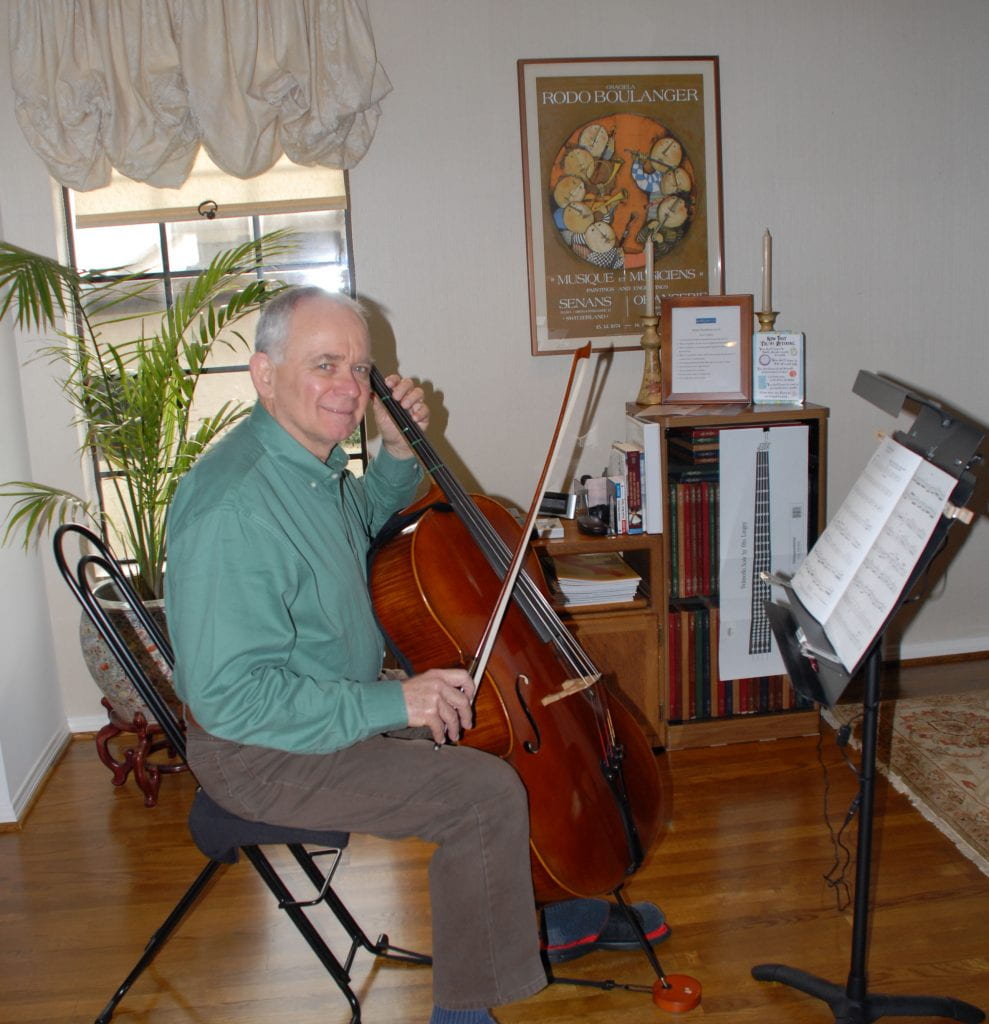By Jonathan Shifflett
Students and teachers can have a mutually beneficial influence. When Rainer Crosett, a Master of Music candidate at USC Thornton School of Music, took on beginning cellist Robert Francis, a retired aerospace engineer, they not only bonded over a shared love of the instrument, they overcame new musical challenges.
In this third installment of Cello Stories, we reached out to both Robert and Rainer to learn more about them and how the Piatigorsky Festival will play a role in their ongoing partnership.
Hi Mr. Francis! Can you tell us a little about your background and where you’re from?
I moved from New York City to Los Angeles 33 years ago with an opportunity to work as an aerospace engineer on satellite power subsystems for The Aerospace Corp. I was raised in a housing project in Trenton, N.J. My father only had a 2nd grade education and was a custodian for a major part of his life. Needless to say my upbringing was in a poor but healthy environment. Music was not offered at my primary and secondary schools. My father just stressed that I get a good education, since he had not the fortune to do so. As such, my childhood development involved concentration on basic school studies. As a result of hard work and self-discipline, I was given the gifts and aptitude to get my PhD in Materials Science and Engineering from the University of Pennsylvania.
What first got you interested in the cello?
When I retired one year ago, my wife, Donna, was concerned about my activities, since many of my colleagues withered soon after retirement. During my professional career I became infatuated with classical music. I was always enthralled during classical music performances with the sound of the cello. The musicians’ movements and interactions with the cello appeared to me like an elegantly performed choreographic dance. And so, at 69 years of age, I found my first teacher and started to learn music theory and to read music and work around the arthritis that had developed in my hands.
Did you face other difficulties?
Another difficulty to overcome has been the change in the way an engineer thinks about problems compared to the way a musician plays and feels the music – a very new right brain activity. I have now been taking cello lessons for less than two years. My present teacher, Mr. Rainer Crosett, has been a gift. He understands and appreciates my difficulties as a senior and as a new musician.
How has Mr. Crosett helped you improve your playing?
I am an older beginning music student with basic music reading skills and came to Rainer frustrated from prior cello instructional experience. He is a miracle because I have had two professional cello teachers who were unable to relate to my specific individual needs and limitations. I became comfortable with Rainer, who so skillfully, patiently, and enthusiastically is able to provide clear demonstration and instruction of methodology and technique. Mr. Crosett not only understands and works around my present musical and physical limitations as a senior but also has a multitude of technical teaching techniques to aid in my learning and appreciation of the cello.
What festival events are you looking forward to the most?
Donna and I will be attending two events at the Walt Disney Concert Hall, one on the first Friday with Ralph Kirshbaum and the second on the following Tuesday to see Rainer play. I will also be attending the festivals on two full day sessions, Monday and Wednesday, and most of Thursday with a concentration in viewing the Masters’ classes. My wife and I will also be attending the Final Gala Concert on May 22nd. I used to attend week long engineering conferences in my area of space power when I worked professionally. Now I am extremely excited to attend this week-long Piatigorsky Festival and be surrounded with the music and the instrument that has taken over a good portion of my retired life.
Mr. Francis’ improvement in his cello studies is no doubt due to good teaching. We decided to ask Rainer Crosett about his teaching method and how working with adult students has helped him become a better teacher. We also asked him to comment on what the festival has to offer cellists of varying age and skill levels.
Thanks so much for being a part of this interview, Rainer. In Robert’s responses, he alluded to your teaching techniques. What’s an example of one that has been particularly effective to his development?
One area of cello technique that Robert and I have been working on is sound production. Since he has a background in engineering and physics, I was especially excited to work with him on the mechanics of producing a rich, resonant, and beautiful cello sound. We’ve worked on finding ways to leverage bodyweight into the strings and developing a relaxed but efficient way to hold and draw the bow. Part of this process of discovery has sometimes involved unorthodox ways of holding the bow – for example, grabbing it like a club – just to free the muscles in his right arm and help him find the best possible sound. My goal is to train his ears to be constantly listening for and demanding more from the quality of sound he produces, often by checking for sympathetic resonance – getting one or more open strings on the cello to ring while playing a stopped note. These methods have already helped him produce a much better sound on the instrument.
 What goals have you and Robert set for his studies? Do those goals include specific repertoire?
What goals have you and Robert set for his studies? Do those goals include specific repertoire?
Robert approached me for lessons with caution, noting that he wasn’t interested in preparing for live performance at this time and didn’t want to be pushed to do so. I have complete respect for that preference and I hope to help him achieve his other goals, which include playing a duet with his wife, a pianist.
As a teacher, what have you learned from working with Robert?
Working with Robert has helped me learn the many different ways that people’s bodies work when it comes to playing an instrument. There is not necessarily always one right answer when it comes to matters of technique – often the path to finding solutions requires a lot of trial and error. This process teaches patience and the value of physical exploration, always guided by careful listening.
In your opinion, what age group stands to learn the most from the Festival?
Cello students of any age and level will find the festival to be an immensely enriching experience. There is no other time when so many of the world’s great cellists congregate in one place, so the festival is an unparalleled opportunity to soak up cello guidance and inspiration during the plethora of masterclasses, workshops, and concerts that will take place. I think it will be a highlight of any cellist’s life in music.
